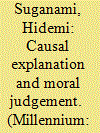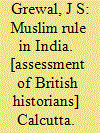| Srl | Item |
| 1 |
ID:
105931


|
|
|
|
|
| Publication |
2011.
|
| Summary/Abstract |
By combining arguments about causal explanation in history found in the writings of Veyne and Dray, this article discusses one plausible line of reasoning which suggests that there is a type of causal explanation which historians offer to which their moral judgements are conceptually integral. It assesses the validity of this line of thinking and suggests that the reason why, in some cases, our moral judgements seep through to our causal explanations is not that certain concepts, such as, in particular, passivity and activity of the key actors' acts, used in our causal narratives, necessarily involve moral judgements for their application, but rather that any explanation is an answer to a question and some causal questions turn out to be, or may plausibly be construed as, asking for our moral views. The 'intrusion' of moral judgement into causal explanation is not logically necessary, but may be contextually appropriate in some cases.
|
|
|
|
|
|
|
|
|
|
|
|
|
|
|
|
| 2 |
ID:
028644


|
|
|
|
|
| Publication |
Calcutta, Oxford University Press, 1970.
|
| Description |
xvi, 218p. bib.hbk
|
|
|
|
|
|
|
|
|
|
|
|
Copies: C:1/I:0,R:0,Q:0
Circulation
| Accession# | Call# | Current Location | Status | Policy | Location |
| 004688 | 954.025/GRE 004688 | Main | On Shelf | General | |
|
|
|
|
| 3 |
ID:
153039


|
|
|
|
|
| Summary/Abstract |
Mobilizing for total war in the 1940s involved the United States in transnational entanglements while erecting novel barriers of censorship. Drawing on underused military and civilian archives, this paper reevaluates how censorship practices aimed at domestic morale illuminate the reconfiguration of moral sensibilities concerning lethal violence in a democratic state.
|
|
|
|
|
|
|
|
|
|
|
|
|
|
|
|